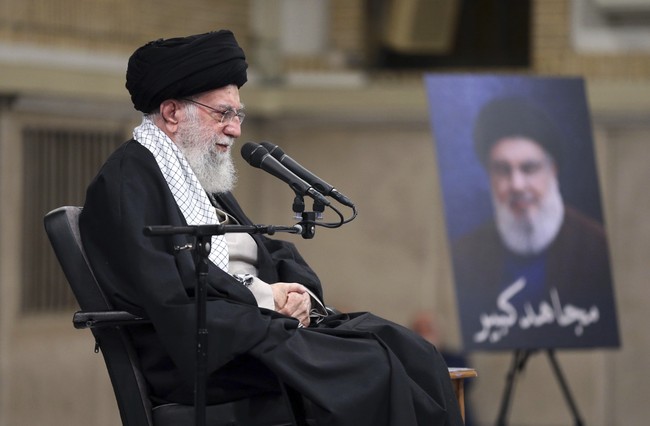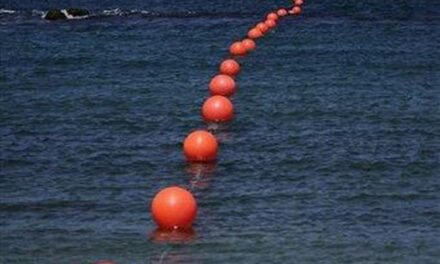We support our Publishers and Content Creators. You can view this story on their website by CLICKING HERE.

Good news, right? Listen, not for nothing, but let us recall The Tale of the Zen Master before we even get to this new development:
This report from the New York Times certainly sounds like good news, perhaps especially for Israel in the short run and maybe even Lebanon. However, count me still in the “We’ll see” camp:
Advertisement
Iran began to evacuate its military commanders and personnel from Syria on Friday, according to regional officials and three Iranian officials, in a sign of Iran’s inability to help keep President Bashar al-Assad in power as he faces a resurgent rebel offensive.
Among those evacuated to neighboring Iraq and Lebanon were top commanders of Iran’s powerful Quds Forces, the external branch of the Revolutionary Guards Corps, the officials said. …
Guards personnel, some Iranian diplomatic staff, their families, and Iranian civilians were also being evacuated, according to the Iranian officials, two of them members of the Guards, and regional officials. Iranians began to leave Syria on Friday morning, the officials said, speaking on condition of anonymity to discuss a sensitive issue.
Iran’s bugging out of Syria! Good news? We’ll see.
For the optimists, this looks very promising indeed. Iran didn’t just prop up Bashar al-Assad out of brotherly friendliness, after all. With Assad in charge, and especially with Iraq available for lines of communication, Syria served as a conduit for the Tehran regime’s extension of power through its terror proxies, especially Hezbollah. For forty years, Assad allowed Iran to flex its muscle on Israel’s borders, not to mention allowing Assad himself to participate in their long war on the Israelis. Iran passed heavy arms to Hezbollah in Lebanon through Syria as well as financing and direct support from the IRGC. In return, Hezbollah helped Assad remain in power after the civil war broke out over a decade ago.
Advertisement
That made Iran’s gamble on Hamas’ October 7 war a very bad bet indeed. Israel has nearly wiped out a generation of leaders from Hezbollah, wiped out much of its deterrent value, and might have weakened the terrorists enough for Lebanom to wrest its sovereignty back from Tehran. With Hezbollah all but impotent, Assad is now facing a rapid collapse and Iran no longer has easy lines of communication to Lebanon and the Israelis. If and when Assad falls, whatever replaces him will be extraordinarily hostile to Iran and Russia (at least for a while), and that will accelerate the demise of Hezbollah.
Good news, then? We’ll see.
The problem is in the phrase “whatever replaces him.” A more liberal friend of mine (a genuine expert on Turkey and the region) and I were discussing this last night, and neither one of us could come up with a positive outcome from this collapse in the longer run. The groups comprising the rebels are mainly a terror offshoot of al-Qaeda that claims to have cut ties and moderated their radical Islamism, communist forces from eastern Syria, and Kurds aligned with the US who will have no hope of controlling the political outcomes after an Assad collapse. Syria is just as splintered in tribal and sectarian rifts as any other nation in the region save Israel and perhaps Saudi Arabia, and the loss of the current dictatorship means the tribal conflicts will no longer be suppressed. The unity of the rebels may last long enough to defenestrate the Assad-aligned Alawites, but after that, the conflicts will emerge in that coalition rapidly.
Advertisement
About the best scenario we could imagine is that Turkey would end up replacing Iran as the power behind the throne in Damascus, but that much of the country would then end up becoming a failed state like Libya. And calling that a best case is a concession to just how bad the current situation looks. Recep Tayyip Erdogan wants to extend Turkish power through appeals to radical Islamists in the region for his own purposes. He’s nowhere near as bad as the mullahs in Tehran, but he’s nowhere near a good guy either.
So … Assad’s fall is bad news, then? Well, we’ll see. Clearly it will benefit Israel and perhaps Lebanon in the short run, as noted above, especially if it means Hezbollah gets starved to death. But that kind of anarchy and chaos usually spreads and becomes a danger to its neighbors, unless the Syrian people can find a way to bring the rebels under civilian control in a secular republic. That’s not an impossible outcome, but it’s also not very likely either, especially in that region, and even more especially in the context of the brutality of the Assad dynasty in Syria. Blood will matter more than reason for a while, and that will only give Syria’s neighbors a short respite from danger.
And we may see very soon, too, as rebel forces apparently have now entered both Hama and Homs, which means they’re getting pretty close to Damascus. How close? Close enough where suburbs like Jarmana are already destroying icons of the Assads:
Advertisement
SYRIA: Anti-Assad protestors bring down Hafez Assad statue in middle of Jarmana (20 min from Damascus). The protests and rebel offensive are only spreading, gradually approaching capital… pic.twitter.com/kkBhGsOlj2
— Joyce Karam (@Joyce_Karam) December 7, 2024
The NYT now reports that the Syrian army is abandoning several such suburbs around the capital:
Syrian government forces have withdrawn from several Damascus suburbs where anti-government protests erupted on Saturday, according to two war monitoring groups, as a rebel offensive farther to the north moved rapidly in the direction of the capital.
The Syrian Observatory for Human Rights said government forces have pulled out of a number of Damascus suburbs including Moadamia al-Sham and Daraya. That could not immediately be confirmed.
This is beginning to look like a cascade. On the other hand, Assad’s office insists he remains in Damascus … for now:
Syrian President Bashar al-Assad is continuing to perform his duties from Damascus, his office says, denying reports he had left as rebels advance toward the capital.
It condemns “rumors and false news about President Bashar al-Assad leaving Damascus,” adding that Assad “is following up on his work and national and constitutional duties from the capital.”
According to the NYT, the Iranians are sending some of its people out by land routes, a very risky maneuver in a time of civil war. That suggests that the air assets are no longer reliable for Tehran or Moscow, which means it’s even more risky for Assad to rely on air travel — especially if his military revolts, which seems likely now. If Assad doesn’t get out soon, he’s going to end up like Moammar Qaddafi, which makes me wonder whether he’s still there at all. If he is, perhaps Assad wants to go down fighting rather than take up his ophthalmological career again in Tehran or Moscow.
Advertisement
Would Assad’s utter defeat be good news? We’ll see, but at least that part doesn’t sound like bad news in and of itself. At the very least, it means the end of Iran’s encirclement strategy aimed at Israel and the Sunni nations of the region, and that is good news for now. It’s what happens next that matters … as the Zen master taught.

 Conservative
Conservative  Search
Search Trending
Trending Current News
Current News 







